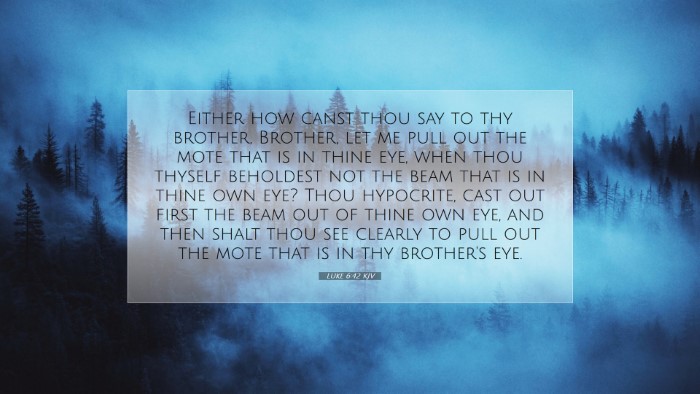Bible Commentary on Luke 6:42
Luke 6:42 states:
"Either how canst thou say to thy brother, Brother, let me pull out the mote that is in thine eye, when thou thyself beholdest not the beam that is in thine own eye? Thou hypocrite, cast out first the beam out of thine own eye, and then shalt thou see clearly to pull out the mote that is in thy brother's eye."
Context and Overview
This verse occurs within the context of Jesus' teachings, specifically in what is often referred to as the Sermon on the Plain (Luke 6:17-49). The emphasis is on the nature of true discipleship and ethical living, illustrating the principle of self-examination over judgment of others.
Commentary Insights
Luke 6:42 draws attention to the human tendency to judge others while ignoring one's own shortcomings. The verse reveals deeper truths about hypocrisy, self-awareness, and the necessity of personal holiness. Below is a synthesis of insights from notable public domain commentaries:
Matthew Henry
Self-Examination Required: Matthew Henry notes that the “mote” represents minor faults or sins seen in others, while the “beam” symbolizes greater faults present in the one passing judgment. He emphasizes that before we approach others to help address their failings, we must first confront our own inadequacies and sinfulness.
Hypocrisy as a Barrier: Henry views this hypocrisy as antithetical to the Christian life, wherein one cannot effectively aid a brother if engulfed in their own larger flaws. This teaching is a call to humility and self-assessment, reminding believers that they must be spiritually fit to be of help to others.
Albert Barnes
Understanding ‘Mote’ and ‘Beam’: Albert Barnes elaborates on the metaphor of “mote” and “beam.” He mentions that the “mote” signifies a speck and the “beam” signifies a log, highlighting the vast difference in scale. Barnes underscores that Jesus is teaching that we often view the faults in others as far more significant when compared to our own, demonstrating human nature's proclivity to underestimate personal defects.
Call to Righteousness: Barnes emphasizes the importance of righteousness when one seeks to correct another, suggesting the necessity of personal rectification before offering critique or assistance. This sequence reflects the moral priority of personal purity leading to effective ministry to others.
Adam Clarke
Cultivating an Attitude of Grace: Adam Clarke brings attention to the grace-filled perspective needed when addressing the faults of others. He notes that the intention behind correction must be genuinely rooted in love and care for the other person’s spiritual well-being. Clarke asserts that the intent is not simply to correct, but to edify.
Importance of Perspective: Clarke’s interpretation stresses that self-awareness leads to a more compassionate approach toward others. He encourages believers to examine their intentions and motives when considering criticisms of others. This aligns with the teachings of Jesus, where the overarching goal is restoration, not condemnation.
Theological Implications
This passage has far-reaching theological implications about sin, judgment, and community life within the body of Christ. It encourages a culture of grace among believers, promoting mutual edification rather than condemnation. As a result, self-examination is seen not just as beneficial but as essential for healthy relational dynamics within Christian communities.
Practical Applications
- Self-Reflection: Encourage congregants to practice self-reflection regularly to identify personal sin and hypocritical attitudes before approaching others.
- Supporting Others: Involved church members should be dedicated to restoration rather than judgment, responding to others' faults with grace and compassion.
- Teaching on Judgment: Pastors may consider teaching on the nature of biblical judgment, emphasizing the importance of restoring gently, as outlined in Galatians 6:1.
Conclusion
Luke 6:42 serves as a poignant reminder of the dangers of hypocrisy in the Christian life. Through the insights of Matthew Henry, Albert Barnes, and Adam Clarke, it becomes evident that self-examination is crucial for true spiritual maturity. By addressing our flaws first, we not only grow closer to God but are also better equipped to serve others in love and truth.


